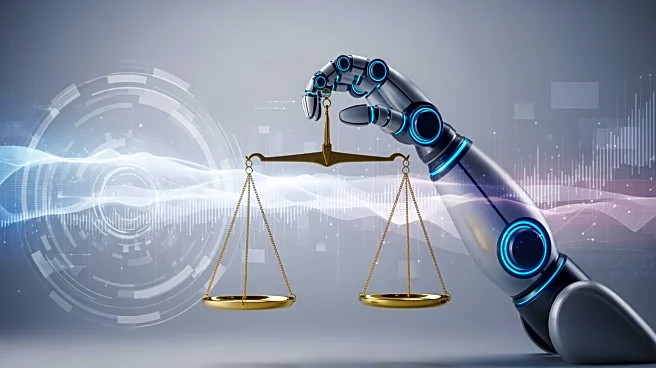What's Happening?
A recent survey conducted by Everlaw and the Association of Corporate Counsel highlights a significant shift in the legal industry regarding the use of generative AI. The study, titled 'Generative AI’s
Growing Strategic Value for Corporate Law Departments,' reveals that 61% of law department professionals are likely to challenge traditional law firm pricing models. Despite this, 59% of respondents are unaware if their law firms currently utilize generative AI, and 80% are not actively encouraging or requiring its use. The survey indicates that the adoption of generative AI by law departments has more than doubled over the past year, enabling in-house counsel to manage more work independently. Petra Pasternak from Everlaw notes that firms integrating generative AI with transparent pricing will stand out as modern, client-focused partners. The survey gathered responses from 657 in-house professionals across 30 countries.
Why It's Important?
The growing adoption of generative AI in law departments signifies a potential transformation in the legal industry, particularly in how services are priced and delivered. By leveraging AI, in-house teams can increase efficiency and reduce reliance on external law firms, potentially leading to cost savings and more streamlined operations. This shift challenges the traditional billable hour model, prompting law firms to reconsider their pricing strategies to remain competitive. As generative AI becomes more prevalent, firms that adapt by offering fair and transparent pricing models may gain a competitive edge, attracting clients who prioritize efficiency and cost-effectiveness. The broader impact could lead to a reevaluation of legal service delivery, influencing industry standards and client expectations.
What's Next?
As law departments continue to adopt generative AI, law firms may face increasing pressure to integrate AI technologies into their practices. This could lead to a reevaluation of pricing models, with firms potentially offering more flexible and transparent billing options. Stakeholders, including law firms and corporate clients, may engage in discussions to establish new industry standards that reflect the efficiencies brought by AI. Additionally, ongoing advancements in AI technology could further enhance the capabilities of in-house legal teams, prompting a shift in the dynamics between law firms and their clients. The legal industry may witness a gradual transition towards more AI-driven processes, impacting how legal services are delivered and priced.
Beyond the Headlines
The integration of generative AI in law departments raises ethical and legal considerations, particularly regarding data privacy and the accuracy of AI-generated outputs. As AI becomes more embedded in legal processes, ensuring compliance with regulatory standards and maintaining client confidentiality will be crucial. Furthermore, the shift towards AI-driven efficiency may alter the traditional roles within law firms, potentially impacting employment and requiring new skill sets. The long-term implications could include a redefinition of legal expertise, with professionals needing to adapt to new technologies and methodologies. This evolution may also influence the cultural dynamics within the legal industry, as firms balance technological innovation with traditional practices.










